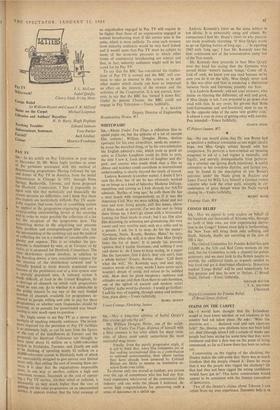Pay TV Whitewash?
Congo Relief Sir William II ayter and Canon T. R. Millard Stains on the carpet Michael Lea prnan Libraries and Authors' Royalties D. Barry, Hugh Popham Edward Samson Tony Parker Jack Lindsay Maurice Freedman F. C. McLean Isabel Quigly, Clancy Sign!, Irving Moss
Teething Troubles Indeterminate Sentences Fascist? Colour
l'AY TV
his article on Pay Television in your issue of December 30, Mr. Brian Inglis touches on some or the problems associated with this method of disseminating programmes. Having followed the Ups and downs of Pay TV in America, from the initial transmissions in Chicago in 1951, through Palm SPrings, Bartlesville, Toronto, and those proposed for Hartford, Connecticut, I find it impossible to agree with him that technically and financially the sYstem presents no difficulties, and I think that these two aspects are particularly difficult. Pay TV essen- tially requires that some form of scrambling system be applied at the programme-originating end and a corresponding unscrambling device at the receiving end in order to make possible the collection of a fee for the reception of the programme item. The scrambling device at the originating end presents little problem and correspondingly-, little cost, but the unscrambling at the receiving end and the method or Collecting the fee is a matter of considerable com- PlexitY and expense. This is so whether the pro- gramme is distributed by wire, as at Toronto, or by radio, as is proposed for Hartford, Connecticut. The Wire distribution system involves, in addition to the decoding device, a very considerable expense for theercction of the distribution network and is
virtually limited to fairly densely populated areas
becataie of the prohibitive cost of a wire system over a sparsely populated area. A radiated system is Made difficult, at least in the United Kingdom, by a shortage of channels on which such programmes Could be sent out. &s to whether it is admissible in the public interest to use any of the very limited number of channels available for programmes re- stricted to people willing and able to pay for these Programmes or whether such frequencies should be reserved, as at present, for unrestricted true broad- casting is very much open to question..
Mr. Inglis seems to see Pay TV as a means par- ticularly of reaching minority audiences. The invest- n, lent required for the provision of Pay TV facilities L' so extremely high, as can be seen from the figures of the cost of the installations in Toronto and the Proposals for Hartford (Telemeter are thought to have spent about $i million on a 6,000-subscriber ,sYstiiin in Etobicokc, Toronto; and Zenith are said to be thinking of spending nearly $2 million on a 10,000-subscriber system in Hartford). both of which are unavoidably designed to give service over limited areas only, that adding the cost of running these ser- vices, it is clear that the organisations responsible Must, in onc way or another, achieve a high and Fcinsistent revenue. Inasmuch as the cost of operat- ing a Pay 'TV service, whether wired or radiated, is
necessarily so very much higher than the cost of Putting out the same programmes on an unscrambled service, it appears evident that the total earnings of
an organisation engaged in Pay TV will require to be higher than those of an organisation engaged in normal broadcasting even if the service area is the same, which is most unlikely. To raise such revenue from minority audiences would be very hard indeed and it would seem that Pay TV must be subject to many of the economic pressures to which other forms of commercial broadcasting arc subject and that, in fact, minority audiences might well be less cared for by Pay TV.
To say that the BBC has considered the implica- tions of Pay TV is correct and the BBC will con- tinue to take an interest in this system, as in any other matter which clearly can have so important an effect on the interests of the viewers and the activities of the Corporation. It is not correct. how- ever, to say that the BBC has 'turned it down flat.' Under its present Charter, the BBC could not engage in Pay Television.—Yours faithfully, . F. C. MCLEAN Deputy Director of Engineering Broadcasting House, WI


































 Previous page
Previous page